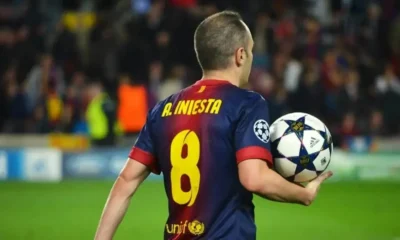Football
LaLiga introduces new financial control rules. They will fundamentally affect Barcelona’s situation
Spanish clubs will have to be wary of windfalls and percentages from transfers that exceed their salary cap. At the end of November, LaLiga’s delegate committee approved and submitted new economic control rules to 42 Spanish clubs for review. From now on, clubs will also have to submit a three-year economic plan.

Spanish clubs will have to be wary of windfalls and percentages from transfers that exceed their salary cap. At the end of November, LaLiga’s delegate committee approved and submitted new economic control rules to 42 Spanish clubs for review. From now on, clubs will also have to submit a three-year economic plan.
FC Barcelona and other LaLiga teams whose wage costs exceed the set limit will have to face the new rules. The existing 1/4 rule will not apply, but a new scenario – 40% – will come into force.
It was approved by the LaLiga Delegates Committee and sent out to 42 clubs in a circular titled “Modification of Rules for the Preparation of Club and Stock Company (SAD) Budgets”. The new control measures had been under consideration for months and the Spanish teams were already aware that this scenario would come into force.
The new regulation contains nine major changes. Three of them are particularly important from Barcelona’s point of view. Firstly, extraordinary revenues generated by, for example, the sale of assets can no longer be included in the full bonus cap in a single season. They must now be spread over as many years as the contract or transfer of rights is in force.
Therefore, future capital leverage or asset sales cannot be fully accounted for to meet the limit. Consequently, the “leverage” has been significantly reduced (e.g., the sale of BLM rights will no longer be useful under Fair Play, given that the revenue will have to be spread over many years).
At the same time, as we read in the circular: “Extraordinary income in the past or current season will count against the salary cap for that season, in proportion to the maximum amount of the asset or right being transferred.”
The second important point relates to the current 1/4 rule, which is increased to 40% for clubs that exceed the limit, as will be the case next summer for example with Barcelona. In other words, for every 10 million a club receives from the sale of a player, it will be able to use up to 4 million to transfer a new player, compared to the 2.5 million allowed under the previous rule.
If the sale of a player results in a saving of 5% of the wage budget, the percentage can increase to 50%.
The third important update is the article on the need to prepare an economic plan for three seasons, e.g. clubs that have made extraordinary financial operations (example:: the use of FC Barcelona’s “financial leverage”).
As Article 93 indicates, for each of these teams “the registration of a player or coach will require the preparation of a treasury plan for the current season and the next two.” However, clubs in a good financial situation are exempted from this obligation. Under the new rules, only teams with a positive balance sheet will be able to sign a player or coach for two or more seasons.
LaLiga president Javier Tebas commented on the rule change. There is no flexibility for a select few. There is also no interpretation. Barcelona knows how it works. The change in economic control is because we want to be in control for more than one season, not out of ill will towards Barcelona, but we live in a country of persecution.”
Source: LaLigaFC Barcelona










